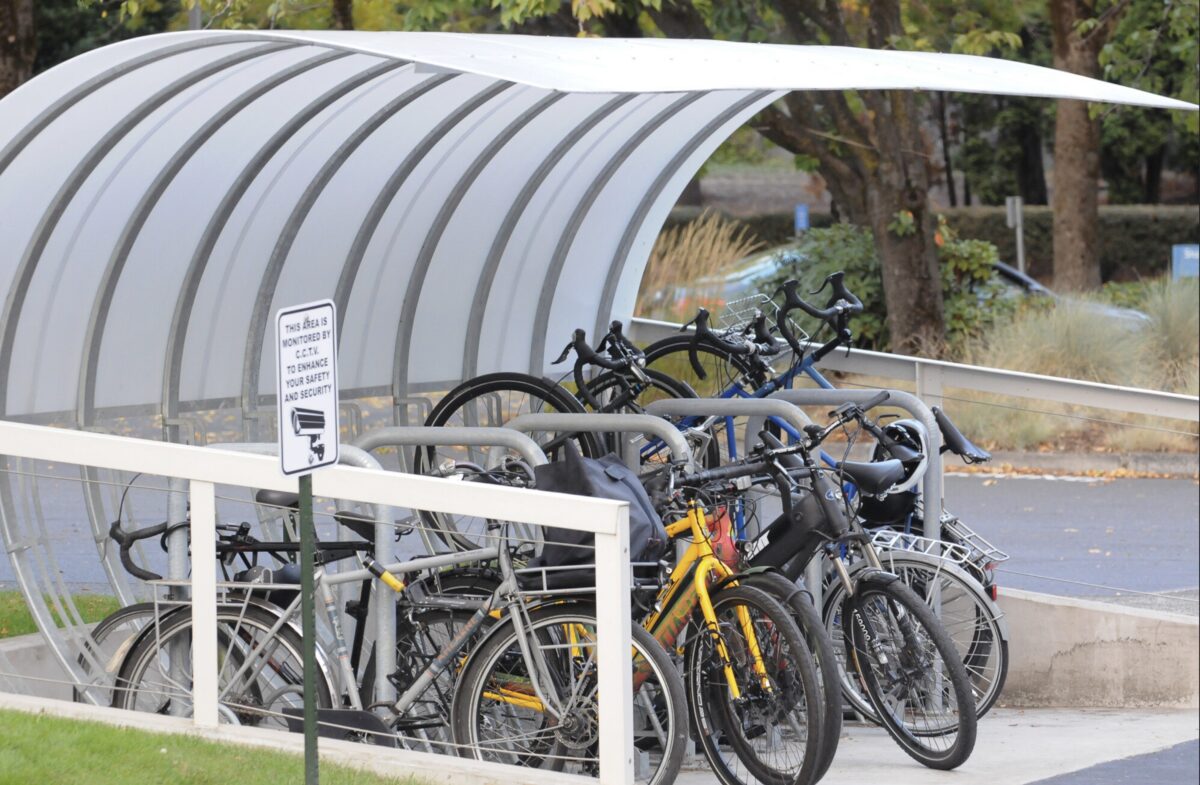

A host of long-awaited updates to Portland’s bicycle parking code were in front of City Council this week. After four years of work to update them, we’re just weeks away from council adoption.
Our current code was adopted in 1996 and has not kept up with demands. The new code aims to set Portland on a path to nearly quadruple the rate of bicycling in 10 years. Its basic premise is that in order to convince 25% of Portlanders to consider riding on a daily basis we must provide accessible and secure places to store their bikes.
During testimony Wednesday, PBOT Active Transportation and Safety Division Manager Catherine Ciarlo broke it down in simple terms for Mayor Ted Wheeler, PBOT Commissioner Chloe Eudaly, and other councilors in attendance. “If there’s cheap, convenient [car] parking available, we’re more likely to drive where we’re going. If there isn’t, we’re less likely. The same principle applies for bikes. If there’s not convenient, secure parking we’re less likely to use a bicycle to get somewhere.”
But no major change in city code is that simple.
When passed (likely early next month), the code would create new requirements for building developers. It would mandate the amount, design, and location of both long-term (for employees and residents) and short-term (for business customers and visitors) bike parking spaces in new buildings.
Advertisement
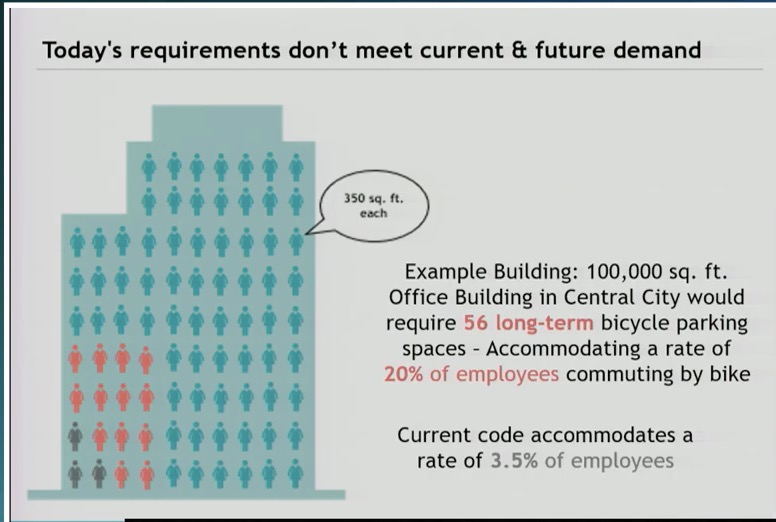


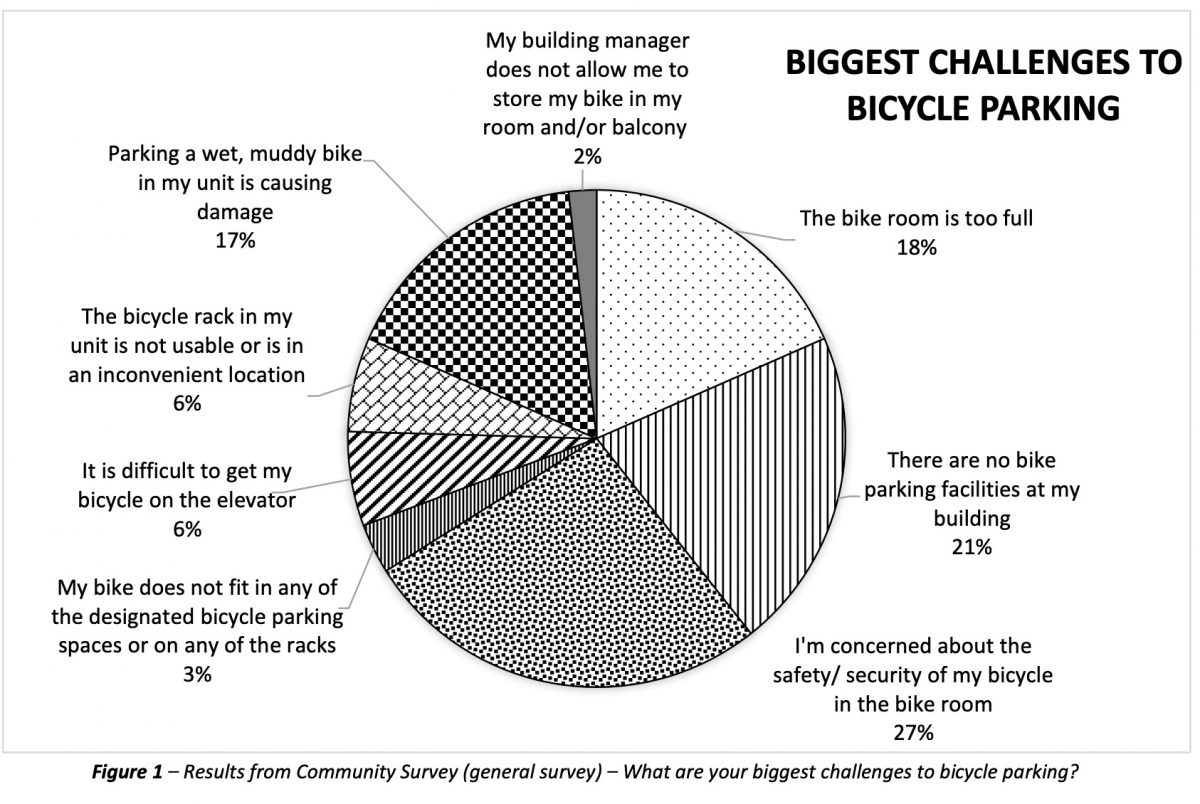
Most of the code update has been non-controversial as there’s widespread understanding that we need to improve the amount and quality of bicycle parking citywide – especially in places like east Portland where Ciarlo said demand will skyrocket after PBOT builds 75 miles of bikeways there over the next five years. The issue that has caused the most heartburn is about how to deal with bike parking in new residential developments.
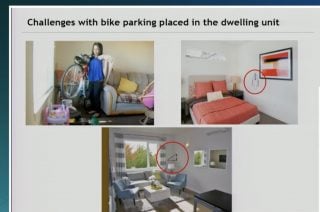
(Via PBOT slide)
The debate pitted two of Portland’s most cherished goals — more bicycling and more affordable housing — against each other.
Current code allows developers to put 100% of required bike parking inside dwelling units. That’s problematic on several fronts. PBOT found that only 20% of people surveyed preferred in-unit bike parking. They also heard many complaints that in-unit racks are often hard to use or non-existent and that building owners would keep security deposits after wet or muddy bikes caused damage. This tilted the policy preference toward bike rooms.
PBOT’s initial proposal would have allowed 0% of required long-term bike parking to be placed in-unit. That was raised to 20% after developers said bike room size requirements would have too much impact on building design. Then affordable housing advocates weighed in and expressed concerns that too much emphasis on bike rooms and bike storage in general would increase project costs. The Portland Housing Bureau wanted exemptions to the in-unit requirements.
But why should people who don’t have as much money have poorer bike parking options? If anything, they need the best bike parking possible. “Good bike parking is an affordability measure,” said Portland Planning & Sustainability (PSC) commissioner Chris Smith during testimony Wednesday. “Households that can make bicycles part of their daily routine save on transportation costs.”
With help from Smith and the PSC, the sides hammered out a compromise.

Advertisement
“A dedicated closet or alcove will add cost to housing by decreasing efficiency and quantity of homes produced… further complicating housing production.”
— Kevin Clark, Oregon Smart Growth
On any residential project with more than 5 units, 50% of long-term bike parking can be in-unit. At buildings with 12 units or less, 100% can be located in-unit. To address concerns about the quality of in-unit parking, the proposal would require all in-unit spaces to be located within 15 feet of the front door and they must be in a “closet or alcove” with ample room (based on standard bicycle footprint of 2 x 6 feet).
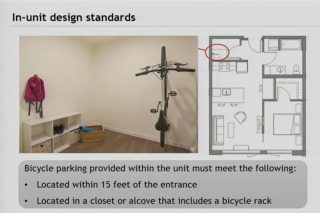
That last requirement doesn’t sit well with Oregon Smart Growth, a group that advocates for “sustainable development”. Kevin Clark, who sits on their board of directors, said during testimony they want the “closet or alcove” language removed from the proposal because it is “overly prescriptive,” “goes too far” and means that in-unit parking “won’t be feasible.” “A dedicated closet or alcove will add cost to housing by decreasing efficiency and quantity of homes produced… The Bureau of Development Services is already concerned that these design standards could add time and complexity to the permitting process, further complicating housing production.”
Later in the meeting, The Street Trust Executive Director Jillian Detweiler testified that she doesn’t support Clark’s position.
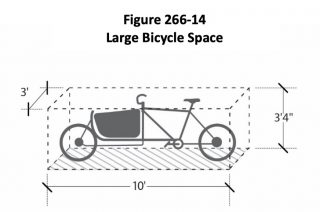
To further placate affordable housing developer concerns, PBOT Commissioner Eudaly introduced an amendment that would exempt 18 affordable housing projects currently in the pipeline. “This is a narrow exemption,” she explained Wednesday, “for 18 projects that have already been funded and fully scoped and having to go back and revise their plans could be incredibly costly and undermine the whole project.”
The new code also aims to make bike parking work for more people. PBOT staffer Liz Hormann said, “The current code is great for able-bodied Portlanders who ride a lightweight, two-wheeled bicycle.” For everyone else, there are new requirements for double-decker racks to have a lift-assist mechanism and a minimum of 30% of spaces must be horizontal (not hooks on a wall which require lifting). If you ride a cargo bike or other oversized bike with a trailer, PBOT is proposing that 5% of required parking spaces have a larger footprint of 3 feet by 10 feet.
Advertisement
“Not having access to dignified, secure bike storage close to home and work creates barriers that affect the most vulnerable people in our community.”
— Miché Lozano, Andando en Bicicletas y Caminando
During public testimony, City Council members heard about the lived experiences of Cully neighborhood residents. Members of Andando en Bicicletas y Caminando, a nonprofit that works to make cycling more fun and accessible for Cully’s many lower-income, spanish-speaking families. The group’s Program Director Miché Lozano brought several ABC members to testify.
Lozano shared how it took years of advocacy for Cully families to get 10 new bike racks. “And it’s still not enough,” they testified. “Many members of our community are denied long-term bike parking solutions and have endured unnecessary suffering at hands of landlords who target them for leaving their bikes on balconies or inside their homes – which are only places they have to safely store them.” Lozano also shared that bike theft is rampant in Cully and they implored councilors to help them. “Not having access to dignified, secure bike storage close to home and work creates barriers that affect the most vulnerable people in our community.”
Several ABC members, speaking through an interpreter, asked council for a bicycle garage so they could get their bikes out of their small apartments and out of the hands of thieves. One woman said she stores three bicycles in her house and fears “constant” searches by her landlord who doesn’t allow them inside the unit. “I don’t know what to do, they stole bikes just this month. I’m worried because my kids use them every day. Please come up with a solution.”
Diane Linn, executive director for affordable housing developer Proud Ground, testified that she understands the, “Critical importance for people of color needing this bike space, but at the same time,” she continued. “We have to be smart about how it would impact other elements,” of housing projects. “We just want to put it out there that we’re concerned how we pay for and support achieving what this bike parking code change represents and also recognize the implications of additional requirements in buildings that already have layers and layers of requirements for all the values the city holds dear.” Referring to bike parking as an “amenity,” Linn told council members the new code could result in less housing and/or smaller units being built and that the code would add to an “overload” of building permit requirements.
“It’s really disappointing to realize there’s been a demand for bike parking in low-income developments for a long time and developers aren’t seeming to be very responsive to that.”
— Chloe Eudaly, City Commissioner
“I appreciate your testimony,” Commissioner Eudaly said in response to Linn. “However after listening to the community members from ABC [Andando en Bicicletas y Caminando] it’s really disappointing to realize there’s been a demand for bike parking in low-income developments for a long time and developers aren’t seeming to be very responsive to that.” “And contrary to the myth out there that cyclists are affluent white people,” Eudaly continued, “the fact is that people who live on low incomes are more likely to bike and walk and depend on bikes than their more affluent neighbors who have cars… Kids need bikes. Of course I don’t want to see units eliminated, but we can’t just disregard this need.”
Two major needs that came up repeatedly at council Wednesday but are not included in this code update are some type of neighborhood bike parking solution, and the need to retrofit existing buildings. Chris Smith addressed these issues in his testimony: “We have lots of old buildings that have not enough or no parking at all. We also need a district parking solution where you could have a bicycle garage to cover the need generated by other properties that were built without bike parking that are difficult to retrofit.” “This is not the end,” of bike parking reform Smith said.
Mayor Wheeler too said this code update is just one piece of the puzzle. In his closing remarks he said, “It is not only my hope but my firm expectation that mode share will change precipitously in the next decade or so. It’s important we start somewhere… This is just one piece of the puzzle and I think it’s very important we push forward on this. If we’re serious about our climate action goals rather than just talking about them, this is the type of policy we need to lead on. And we will.”
Council will vote on amendments next Wednesday November 20th and a second reading of the ordinances is set for November 27th. You can still weigh in by leaving your feedback on the Map App. You can also learn more on the project website or view the draft recommendations here (PDF).
— Jonathan Maus: (503) 706-8804, @jonathan_maus on Twitter and jonathan@bikeportland.org
— Get our headlines delivered to your inbox.
— Support this independent community media outlet with a one-time contribution or monthly subscription.



